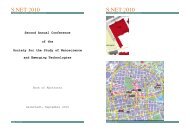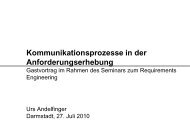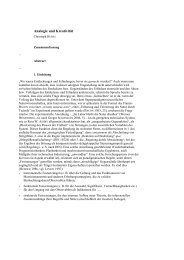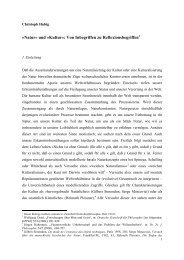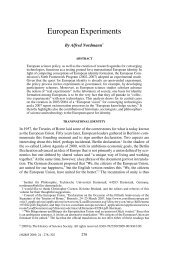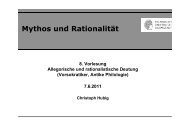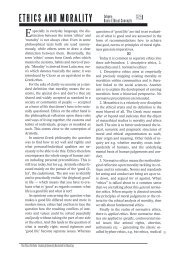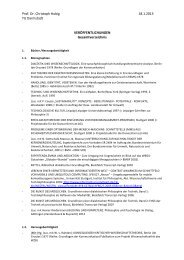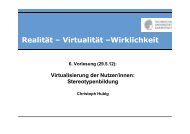If and Then: A Critique of Speculative NanoEthics - Common Sense ...
If and Then: A Critique of Speculative NanoEthics - Common Sense ...
If and Then: A Critique of Speculative NanoEthics - Common Sense ...
You also want an ePaper? Increase the reach of your titles
YUMPU automatically turns print PDFs into web optimized ePapers that Google loves.
Nanoethics (2007) 1:31–46 33<br />
deliverances <strong>of</strong> this vaguely all-powerful technology.<br />
The appeal to “nano” lends an air <strong>of</strong> real authority to<br />
claims regarding the achievement <strong>of</strong> immortality <strong>and</strong><br />
establishes the if-<strong>and</strong>-then: <strong>If</strong> the requisite human<br />
enhancement technologies become reality, we are<br />
now to know, for example, whether people have a<br />
right <strong>of</strong> access to them – <strong>and</strong> failure to address this<br />
issue might leave us unprepared for the time when<br />
these technologies arrive (note the displacement <strong>of</strong><br />
the “if ”). 3<br />
Human enhancement, to be sure, is just one<br />
example <strong>of</strong> many: <strong>If</strong> it should be possible to create a<br />
direct interface between brains <strong>and</strong> machines, this<br />
research threatens an invasion <strong>of</strong> privacy when<br />
machines are used to read human minds. 4 <strong>If</strong> molecular<br />
manufacturing were to be achievable within the next<br />
20–50 years, we need to prepare for an age <strong>of</strong> global<br />
abundance <strong>and</strong> thus a new organization <strong>of</strong> our<br />
economies. 5 <strong>If</strong> the development <strong>of</strong> machine intelligence<br />
leads to ever greater machine agency, we need<br />
to adjust our criminal codes to hold machines<br />
3 This if-<strong>and</strong>-then is at work in the following passage. “Like any<br />
extremely powerful new technology, nanotechnology will bring<br />
with it social <strong>and</strong> ethical issues. [...] consider the claim that<br />
nanobiology will enable people to live longer, healthier lives.<br />
Longer average lifetimes will mean more people on Earth. But<br />
how many more people can the Earth sustain?” [1, p. 8] Note<br />
the “reification <strong>of</strong> a possible future” (Arie Rip, in conversation),<br />
the transition from a merely claimed possible future to the<br />
issues that undoubtedly will arise.<br />
4 This possibility was raised in a highly qualified hypothetical<br />
manner by Moor <strong>and</strong> Weckert [26, 306]: “... theoretically with<br />
nanotechnology <strong>and</strong> wireless transmission a person’s brain<br />
functioning could be unknowingly tapped <strong>and</strong> information<br />
about it transmitted. Reading someone else’s thoughts might be<br />
difficult, but capturing information that would be indicative <strong>of</strong> a<br />
particular mental state, such as anger or sexual arousal, might<br />
be rather easy.” In a far less qualified manner, a November 10,<br />
2006 conference <strong>of</strong> legal <strong>and</strong> data protection experts discussed<br />
this foreshortened conditional: <strong>If</strong> the most extravagant neuroscientific<br />
claims were proven true <strong>and</strong> thoughts were materialized<br />
in the brain, images <strong>of</strong> the brain call for privacy protection<br />
since they capture an individual’s state <strong>of</strong> mind (“Die Gedanken<br />
sind frei ... – Hirnforschung und Persönlichkeitsrechte,”<br />
organized by the L<strong>and</strong>esbeauftragte für Datenschutz und<br />
Informationsfreiheit Nordrhein-Westfalen <strong>and</strong> the Institut für<br />
Informations-, Telekommunikations-, und Medienrecht). At that<br />
conference, the contribution by Petra Gehring effectively<br />
undermined this if-<strong>and</strong>-then.<br />
5 This is one <strong>of</strong> the main tenets <strong>of</strong> the so-called Center for<br />
Responsible Nanotechnology, http://www.crnano.org/.<br />
responsible. 6 Also, if nanomedical lab-on-a-chip<br />
diagnostics <strong>and</strong> genetic screening technology become<br />
st<strong>and</strong>ard practice, there arises in many more cases the<br />
predicament <strong>of</strong> knowing a condition or disease where<br />
there is no treatment or cure. 7 And if, finally, it is<br />
scientifically possible to extend human life-expectancy<br />
indefinitely, any objections to this research agenda<br />
are tantamount to murder or at least to the failure <strong>of</strong><br />
coming to the aid <strong>of</strong> a dying person who can be<br />
saved. 8<br />
The last <strong>of</strong> these examples illustrates with particular<br />
clarity how speculative ethics is used to invent a<br />
m<strong>and</strong>ate for action. The true <strong>and</strong> perfectly legitimate<br />
conditional “if we ever were in the position to<br />
conquer the natural ageing process <strong>and</strong> become<br />
immortal, then we would face the question whether<br />
withholding immortality is tantamount to murder”<br />
becomes foreshortened to “if you call into question<br />
that biomedical research can bring about immortality<br />
within some relevant period <strong>of</strong> time, you are complicit<br />
with murder” –no matter how remote the possibility<br />
that such research might succeed, we are morally<br />
obliged to support it. 9 The following study takes a<br />
closer look at arguments like these – aiming not only<br />
to debunk them one at a time but to make a general<br />
6 Futurologist Ian Pearson <strong>and</strong> many others have advanced this<br />
proposal.<br />
7 This if-<strong>and</strong>-then is currently popular in discussions <strong>of</strong> nanomedicine.<br />
Aside from stating a discrepancy that arises for the<br />
diagnosis <strong>of</strong> any incurable illness, its popularity owes to the<br />
fact that it flatters nanomedical research: We are to take for<br />
granted that, in fact, nanomedicine will vastly increase<br />
diagnostic power.<br />
8 Aubrey deGrey, for example, asserts: “I just want to save lives.<br />
I see no difference between preventing someone’s death<br />
through medicine <strong>and</strong> preventing death through defeating<br />
ageing. It’s just not a distinction” (quoted in [25], p. 54).<br />
9 Compare this to “<strong>If</strong> current global warming trends continue,<br />
The Netherl<strong>and</strong>s will be submerged within a few decades.” This<br />
conditional differs from the if-<strong>and</strong>-then in that it has not served<br />
to motivate ethical debate or public preparedness (let alone to<br />
construct a new ethics for these changed conditions). Instead, it<br />
served only as a backdrop to the salient questions whether we<br />
have reason to believe that current trends will continue <strong>and</strong>, if<br />
yes, whether or not we can do something to prevent them from<br />
continuing. These salient questions do not pertain to an<br />
imminent future but concern the present <strong>and</strong> past. “Foreshortening<br />
the conditional” consists also in skipping this focus on<br />
present conditions that alone decide whether the antecedent is<br />
or can be satisfied.





